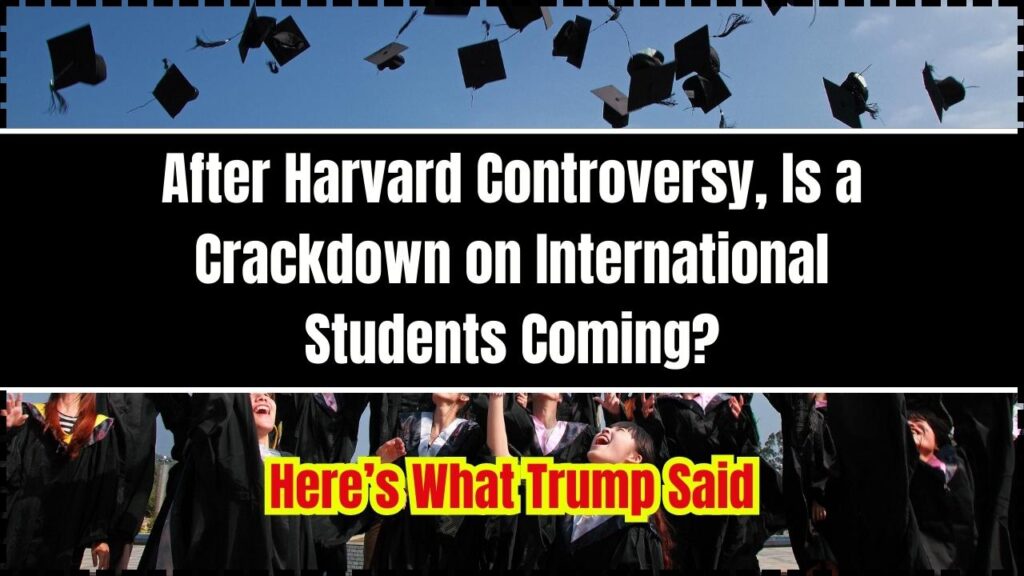
Is a Crackdown on International Students Coming? In a move that has sent shockwaves through academia and beyond, the Trump administration recently revoked Harvard University’s certification to enroll international students, citing concerns over campus safety and alleged noncompliance with federal policies. This unprecedented action has raised questions about the future of international students in the United States and the broader implications for higher education institutions nationwide.
The decision, announced on May 22, 2025, by Homeland Security Secretary Kristi Noem, effectively barred Harvard from accepting new international students and required nearly 6,800 current foreign enrollees to transfer or risk deportation. The administration accused Harvard of fostering an unsafe environment, promoting antisemitism, and coordinating with the Chinese Communist Party—a claim made without evidence.
Is a Crackdown on International Students Coming?
The revocation of Harvard University’s certification to enroll international students marks a significant development in U.S. immigration and education policy. While a temporary restraining order has halted immediate consequences, the situation underscores the need for vigilance and proactive measures by students and institutions alike. As legal proceedings unfold, the broader implications for international education in the United States remain a critical area of focus.
| Aspect | Details |
|---|---|
| Action Taken | Revocation of Harvard’s certification to enroll international students |
| Date | May 22, 2025 |
| Affected Students | Approximately 6,800 international students |
| Administration’s Justification | Alleged campus safety concerns and noncompliance with federal policies |
| Harvard’s Response | Filed a lawsuit challenging the revocation |
| Legal Outcome | Temporary restraining order issued by a federal judge |
| Potential Broader Impact | Signals possible increased scrutiny of other universities’ international student programs |
| Economic Implications | International students contribute over $43.8 billion annually to the U.S. economy |
| Official Resources | U.S. Department of Homeland Security |
Understanding the Context
The Revocation Explained
The Trump administration’s decision to revoke Harvard’s ability to enroll international students stems from allegations that the university failed to comply with federal requests for information related to campus safety and antisemitism. Homeland Security Secretary Kristi Noem stated that the move was necessary to “restore accountability” and serve as a warning to other institutions.
Harvard’s Legal Challenge
In response, Harvard filed a lawsuit arguing that the revocation was unlawful and violated constitutional protections. A federal judge in Massachusetts issued a temporary restraining order, allowing Harvard to continue admitting international students while the legal battle proceeds.
Practical Implications for International Students
Immediate Concerns
- Visa Status: Students currently enrolled at Harvard faced uncertainty regarding their visa status, with the potential need to transfer to other institutions to maintain legal residency.
- Academic Disruption: The sudden policy shift threatened to disrupt academic progress, research projects, and graduation timelines for thousands of students.
Broader Impact
The situation at Harvard may signal a broader crackdown on international students across the United States. Other universities could face increased scrutiny, leading to potential policy changes affecting foreign enrollment and campus policies.
Economic and Professional Considerations
Economic Contributions
International students play a significant role in the U.S. economy, contributing over $43.8 billion annually through tuition, housing, and other expenditures.
Professional Pathways
Many international students pursue careers in the United States post-graduation, filling critical roles in various industries. Policy changes affecting their ability to study and work in the U.S. could have long-term implications for the country’s workforce and innovation landscape.
Navigating the Uncertainty: A Guide for Students and Institutions
For International Students
- Stay Informed: Regularly check official university communications and government websites for updates on visa policies and legal proceedings.
- Consult Legal Advisors: Seek guidance from immigration attorneys or university legal services to understand your rights and options.
- Explore Transfer Options: If necessary, research other institutions that can accommodate your academic pursuits and visa requirements.
For Educational Institutions
- Review Compliance Protocols: Ensure adherence to federal regulations and maintain transparent communication with government agencies.
- Support Affected Students: Provide resources and assistance to international students navigating visa challenges and potential transfers.
- Engage in Advocacy: Collaborate with other institutions to advocate for fair and consistent policies regarding international education.
Federal Retirement Cuts Approved: What the House’s New Bill Means for Government Workers
Moody’s Shocks Markets By Slashing America’s Pristine Credit Rating Over Soaring Debt
GOP Tax Bill Contains a Quiet Threat to Federal Workers; Could This Be the End of the Civil Service?
Frequently Asked Questions (FAQs)
Q1: What led to the revocation of Harvard’s certification to enroll international students?
A: The Trump administration cited concerns over campus safety and alleged noncompliance with federal policies as reasons for revoking Harvard’s certification.
Q2: How does this decision affect current international students at Harvard?
A: Initially, students faced the possibility of transferring to other institutions or risking deportation. However, a federal judge issued a temporary restraining order, allowing them to remain enrolled while legal proceedings continue.
Q3: Could other universities face similar actions?
A: Yes, the administration has indicated that other institutions may be subject to increased scrutiny regarding their international student programs.
Q4: What are the economic implications of such policy changes?
A: International students contribute significantly to the U.S. economy. Restrictive policies could lead to decreased enrollment, affecting university revenues and the broader economic landscape.
Q5: Where can I find official information and updates?
A: For the latest information, visit the U.S. Department of Homeland Security and Harvard University’s official website.











